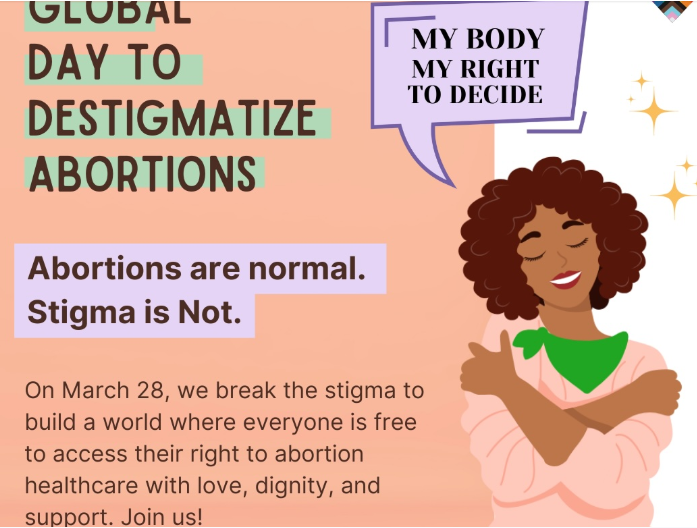Right to Safe Abortion: A Critical Human Right
On March 28, the Global Day of Action to Destigmatize Abortion, advocates for reproductive rights renewed calls for stronger efforts to end the criminalization of abortion, dismantle harmful cultural narratives, and ensure stigma-free access to safe abortion services worldwide.
Abortion is a fundamental human right, but in many parts of the world, restrictive laws, medical gatekeeping, and societal stigma continue to prevent individuals from accessing the care they need.
The United Nations Special Rapporteur on the Right to Health, Dr. Tlaleng Mofokeng, voiced her concerns about the slow progress in realizing the right to health and gender equality globally. She emphasized that despite international agreements, such as the Beijing Declaration (1995) and CEDAW, and the inclusion of reproductive rights in the UN Sustainable Development Goals (SDG 5), significant barriers remain.
Dr. Mofokeng stated, “We are not on track to realize the right to health and gender equality. Despite committing to Agenda 2030, we are not doing well in delivering the promises of the UN SDGs.”
Abortion is common worldwide, with an estimated 73 million induced abortions taking place annually. Yet, what is deeply concerning is that around 45% of these abortions are unsafe, leading to preventable maternal deaths and disabilities. Unsafe abortion remains one of the leading causes of maternal mortality and morbidity, claiming the lives of approximately 29,000 women and girls each year. In addition to fatalities, millions suffer injuries or lifelong disabilities from unsafe procedures.
Unsafe abortion disproportionately affects women in low-income countries, with more than half of all unsafe abortions occurring in Asia, particularly South and Central Asia. In Africa and Latin America, approximately 75% of abortions are unsafe, with Africa having nearly half of all abortions performed under the most dangerous conditions.
Dr. Tlaleng Mofokeng pointed out that the preventable deaths caused by unsafe abortion could be avoided with improved access to safe, timely, and respectful abortion care. She added, “Lack of access to safe abortion care is the root cause of these preventable maternal deaths.”
Bodily autonomy—the right to make informed decisions about one’s own body—is a core human right. When individuals lack the right to choose whether or not to continue a pregnancy, they face violations of their bodily autonomy, often leading to unsafe abortions.
Dr. Mofokeng stressed that this violation of bodily autonomy affects not only women but also gender-diverse individuals who may face discrimination and limited access to reproductive healthcare.
“The idea that one can dislocate the right to health, including the right to safe abortion, from other human rights is impossible,” said Dr. Mofokeng. “By realizing the human right to health, we are not only ensuring reproductive rights but also advancing gender equality.”
Investing in sexual and reproductive health yields significant returns. Dawn Minott, an Advisor on Gender and Gender-based Violence at the United Nations Population Fund (UNFPA), highlighted that for every $1 invested in family planning and maternal health in developing countries, the return is estimated to be $8.40. These investments empower women and girls, improving their health, economic opportunities, and social agency.
Minott also discussed progress in SDG indicator 5.6.1, which measures women’s ability to make decisions about their sexual and reproductive health. While initial analysis suggests that over half (56%) of married women now have control over their reproductive choices, 44% of partnered women are still unable to make essential decisions regarding their health and contraception.
Despite these advancements, the battle for reproductive rights is under siege. Anti-rights and anti-gender movements are increasingly challenging hard-won gains in gender equality and reproductive health.
Fadekemi Akinfaderin, Chief Global Advocacy Officer at Fòs Feminista, warned that such movements are using similar-sounding frameworks to dismantle international agreements on sexual and reproductive health.
She also expressed concerns about the growing criminalization of healthcare and attacks on health institutions, which undermine the rights of women and gender-diverse people.
Dr. Payal Shah, Director of Legal, Research, and Advocacy at Physicians for Human Rights, echoed these concerns, calling for immediate action by global stakeholders to address the escalating attacks on gender equality and healthcare.
She also emphasized the importance of addressing reproductive violence in conflict settings, such as in Gaza and Ethiopia, where reproductive autonomy is systematically deprived.
The world is not on track to deliver on SDG 5, which promises gender equality by 2030. The assault on reproductive rights, as seen in the Geneva Consensus Declaration, the Madrid commitment, and the Mexico City Policy, is threatening to reverse the progress made. Governments must act with urgency to protect bodily autonomy and ensure that reproductive rights are upheld for all.
SHE & Rights (Sexual Health with Equity & Rights), hosted by organizations such as the Global Center for Health Diplomacy and Inclusion (CeHDI), International Planned Parenthood Federation (IPPF), and the Women’s Global Network for Reproductive Rights (WGNRR), is calling for a global response to this urgent issue.



